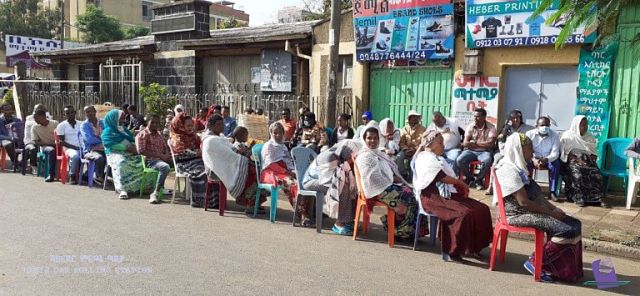 Patient voters during the June 21 Ethiopia election. (Photo via Lawrence Freeman Africa And The world Blog)
Patient voters during the June 21 Ethiopia election. (Photo via Lawrence Freeman Africa And The world Blog)
Lawrence Freeman Africa and the World Blog
What’s Wrong With U.S. Policy For Ethiopia and Africa?
Knowledgeable American analysts of U.S.-African relations are disturbed by the U.S. government’s treatment of Ethiopia. In the first six months of the Biden Presidency, we have witnessed a dramatic reversal of U.S. support for a long standing ally in the Horn of Africa. Ethiopia, the second largest nation in Africa, has been a regional leader, with its bold economic vision to improve the lives of its 110 million people.
Ethiopia has achieved two major accomplishments under the leadership of Prime Minister Abiy Ahmed during June and July. First, the successful June 21st national elections, and second, the natural partial filling of the Grand Ethiopian Renaissance Dam (GERD).
Regrettably, there were no robust congratulations from President Biden for either achievement. Following the freest, fairest, and most peaceful elections in Ethiopia’s history, U.S. Secretary of State, Antony Blinken’s only comment was: “the United States commends those who exercised their right to vote on June 21.” Unusual for elections in Africa, not one individual died in Ethiopia’s voting process. In contrast, several Americans died during the January 6th, violent protest of the U.S. electoral vote.
Equally astonishing, President Biden failed to praise the second filling of almost 14 billion cubic meters of water in the reservoir of the GERD, which will lead to production of electricity later this year. Following in the footsteps of former President Trump, the Biden administration and the Democrat controlled Congress, have tried to discourage Ethiopia from filling the GERD. Despite Ethiopia’s important role in Africa, Prime Minister Abiy’s notable reform movement, and the success of his Prosperity Party, President Biden has never talked to the Prime Minister.
America’s Agenda for Democracy
Secretary of State Blinken along with several other officials from the Obama administration are leading President Biden’s global foreign policy with their mantra: “democracy, human rights, and rule of law.” But what do these words mean other than a desire to impose their world order on other nations.
Prime Minister Abiy’s non-ethnic based Prosperity Party won overwhelmingly in a democratic election deemed fair, free of violence and intimidation, and credible. Ethiopia Election: A Vote for Peace, Unity, and Prosperity. Millions of Ethiopians approved of Prime Minister Abiy’s policies, giving him a mandate to lead for another five years. That is democracy.
Shouldn’t “human rights” include the most fundamental right; the right for human beings to live a productive and dignified life? How is that possible when Africans are suffering from abject poverty, lack of food, clean water, and electricity. It is not possible.
The solution lies in physical economic development that transforms the conditions of life. As the Ethiopians are fond of saying: “eliminate poverty, don’t manage it.” Aid is not sufficient. Building vital infrastructure is an absolute necessity, not an option. More than anything else, African nations need electricity—a thousand gigawatts at least. Africa needs a minimum of 50,000 kilometers of high speed railroads. With the billions of dollars in aid given to African nations, transformative infrastructure projects could have been built. Isn’t the right to electricity a human right?
Then, why hasn’t Ethiopia been profusely praised for building the GERD to produce 6,200 megawatts (6.2 gigawatts) of electricity. Physical economic development is the most fundamental of human rights.
—
Join the conversation on Twitter and Facebook.

























